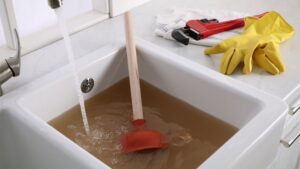Having a clogged kitchen drain can be a real headache. If left untreated, it disrupts your daily routine and can lead to unpleasant odors and even water damage. But fear not because this blog will share practical tips to help you unclog your kitchen drains and get them flowing smoothly again. We will discuss the common causes of kitchen drain clogs and the preventive measures you can take to avoid them in the first place. We will also explore chemical-free methods for unclogging drains and the option of using chemical drain cleaners when necessary. And if all else fails, we will guide you when it’s time to seek professional help. So say goodbye to those stubborn clogs and hello to a fully functioning kitchen sink!
Causes of a Kitchen Drain Being Clogged
To maintain the optimal functionality of your kitchen drains, it is crucial to understand the various factors that can lead to clogs. One common cause is accidentally dropping utensils or small kitchen tools into the sink, which can create obstructions. Another factor is the gradual buildup of food particles over time. It is best to avoid pouring grease and oil down the drain as they tend to solidify and cause blockages within the pipes. Hard water deposits can accumulate and contribute to clogs as minerals build up over time. In some cases, tree roots infiltrating the lines can pose a significant problem. By being aware of these potential causes, you can take proactive measures to prevent clogs and ensure smooth drainage in your kitchen.
Regularly cleaning and maintaining your drains is essential for preventing clogs. Drain guards or strainers can help catch debris before it enters the pipes. Properly disposing of grease by allowing it to cool and then discarding it in a sealed container instead of pouring it down the drain is also essential. In addition to these preventive measures, scheduling periodic professional drain inspections and cleanings can help identify any potential issues before they become significant problems. A professional plumber will have specialized tools and equipment to remove any stubborn clogs or tree roots from your pipes, ensuring your drainage system remains in top condition. By taking these proactive steps, you can minimize the risk of clogged kitchen drains and avoid costly repairs in the future.

Regular Maintenance and Preventive Measures
Proper maintenance and preventive measures are essential for maintaining the smooth functioning of kitchen drains, sink strainers, and garbage disposals. One crucial step is to avoid pouring grease or oil down the drain, as they can solidify and cause clogs. Instead, it is recommended to use a stopper or strainer to catch food scraps and prevent them from entering the plumbing system. Regular sink cleaning is also essential to remove any buildup of gunk. Mixing baking soda, vinegar, and hot water effectively cleans the sink.
For stubborn clogs, a plunger or plumbing snake may be necessary to dislodge the blockage. However, if the issue persists or becomes severe, it is advisable to seek assistance from a professional plumber specializing in unclogging kitchen drains. They have the expertise and experience to effectively resolve the problem while avoiding further damage to your plumbing system. Following these preventive measures and conducting regular maintenance can prevent costly repairs in the long run and ensure that your kitchen drains function smoothly.
Chemical-Free Unclogging Methods
When faced with a stubborn clog in your kitchen drain, it can be incredibly frustrating. However, there are chemical-free methods that you can utilize to unclog it effectively. One of the options is to use a plunger, as it creates suction and can dislodge the blockage. Simply place the plunger over the drain and vigorously pump it up and down to create pressure. This can often solve minor clogs. Alternatively, you can try mixing baking soda and white vinegar, as this natural combination breaks down the clog. Start by pouring about half a cup of baking soda down the drain, followed by an equal amount of white vinegar. Let the mixture sit for about 30 minutes, then flush it with hot water.
For more stubborn clogs, employing a drain snake or auger to remove the blockage from the drain physically is highly effective. Insert the end of the snake into the drain and twist it clockwise while pushing it forward. This will help break up and remove any debris causing the clog. Moreover, pouring boiling water down the drain helps break up grease and debris buildup. To prevent future clogs and maintain proper drainage, it is vital to clean your drains regularly. You can do this by pouring a mixture of hot water and dish soap down your drains every few weeks. It’s important to note that if these methods do not work or you are unsure how to proceed, it may be best to seek professional help from a plumber. They have the expertise and tools to handle even the most stubborn clogs safely and effectively.
Using Chemical Drain Cleaners
Chemical drain cleaners can be a convenient and effective solution for a clogged kitchen drain. These cleaners are specially formulated to break down grease, food particles, and common debris accumulating in kitchen sinks and garbage disposals. However, it is essential to use them safely and follow the instructions on the packaging. When selecting a drain cleaner for your kitchen, make sure to choose one that is specifically designed for this purpose. Follow the recommended dosage and allow the cleaner to sit in the clogged drain for a time. Afterward, flush the drain with hot water to remove any remaining debris and restore proper drainage.
It is worth noting that chemical drain cleaners should be used sparingly and as a last resort. This is because they have the potential to damage pipes and can have adverse effects on the environment. Before reaching for chemical solutions, exploring alternative methods or seeking professional assistance for stubborn clogs in your kitchen drain is advisable. Some alternative methods include using a plunger or plumbing snake to dislodge the blockage manually or utilizing natural remedies such as baking soda, vinegar, or hot water mixed with dish soap. If these methods do not resolve the issue, it may be necessary to call a professional plumber with specialized tools and expertise to handle more severe clogs.
Seeking Professional Help
When faced with a stubborn clog in your kitchen drain, it can be tempting to try and fix it yourself. However, it is always best to enlist the services of a professional plumber in such situations. These skilled experts have the necessary knowledge, experience, and specialized equipment to tackle even the most persistent drain clogs effectively. Hiring a professional plumber can save you time and money in the long run. They have the expertise to quickly identify the underlying cause of the clog and implement an appropriate solution. Attempting to fix the clog yourself may damage your kitchen drain system further, resulting in more costly repairs.
In addition to their immediate problem-solving abilities, professional plumbers can also provide expert advice on properly maintaining your kitchen drain system and avoiding similar issues in the future. By relying on their services, you can ensure a reliable and long-lasting fix that will prevent future clogs. Overall, when dealing with stubborn kitchen drain clogs, it is highly recommended to seek the assistance of a professional plumber. Their expertise and specialized equipment will help resolve the issue efficiently and effectively, saving you time, money, and unnecessary stress.
The Benefits of Unclogging Kitchen Drains
Here are some of the advantages of keeping your kitchen drains clear and free from clogs:

- Proper Functioning: Unclogging kitchen drains ensure that they function correctly. Clogs can lead to slow drainage or complete blockages, making washing dishes, cleaning vegetables, or disposing of food waste difficult. By clearing the drains, you restore their efficient operation, allowing water and waste to flow freely.
- Prevents Foul Odors: A clogged kitchen drain can emit unpleasant odors caused by trapped food particles, grease, and other debris. These odors can spread throughout your kitchen, making it an uncomfortable and unhygienic space. Unclogging the drain removes the cause of the foul smells, helping to maintain a fresh and pleasant environment.
- Reduces Risk of Water Damage: Clogged kitchen drains can cause water to back up and overflow, potentially leading to water damage in your home. The excess water may seep into cabinets, flooring, or walls, causing structural damage and promoting the growth of mold and mildew. Unclogging the drain minimizes the risk of water damage and the associated costly repairs.
- Prevents Plumbing Issues: Clogs in kitchen drains can indicate underlying plumbing issues. They may lead to more severe problems, such as burst pipes or leaks, if left unresolved. By addressing clogs promptly, you can identify and address any potential plumbing issues early on, preventing major disruptions and costly repairs in the future.
- Improves Hygiene: Unclogging kitchen drains improves hygiene in your home. When drains are clogged, they can become breeding grounds for bacteria, germs, and pests. These can contaminate your kitchen and compromise the cleanliness of your utensils, countertops, and food preparation areas. Keeping your drains clear creates a cleaner and healthier environment for cooking and food handling.
Conclusion
In conclusion, Clear Choice Drain Solutions in Braintree, MA, is your go-to resource for practical tips on unclogging kitchen drains. By following these expert recommendations, you can ensure the proper functioning of your drains, prevent foul odors and water damage, maintain a hygienic kitchen environment, and extend the lifespan of your plumbing fixtures. Don’t let clogged drains disrupt your daily routine – contact Clear Choice Drain Solutions today for reliable and efficient solutions to keep your kitchen drains clear and free from blockages.
